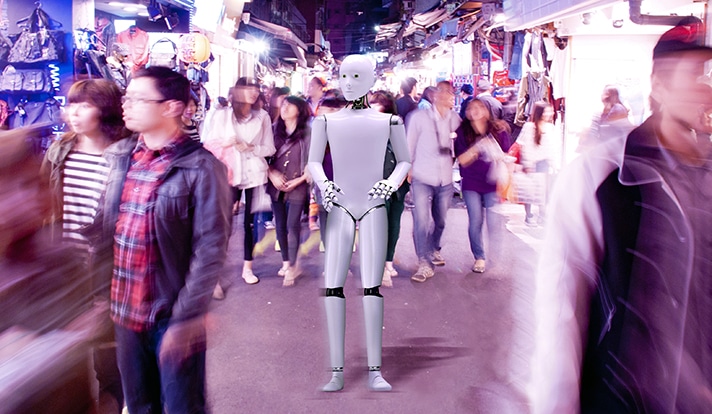May 18 2017
Artificial intelligence doesn’t have to be super-sophisticated to make a difference in people’s lives, according to a new Yale University study. Even “dumb AI” can help human groups.
 Credit: Cavan Huang/Getty Images
Credit: Cavan Huang/Getty Images
In a series of experiments using teams of human players and robotic AI players, the inclusion of “bots” boosted the performance of human groups and the individual players, researchers found. The study appears in the May 18 edition of the journal Nature.
“Much of the current conversation about artificial intelligence has to do with whether AI is a substitute for human beings. We believe the conversation should be about AI as a complement to human beings,” said Nicholas Christakis, co-director of the Yale Institute for Network Science (YINS) and senior author of the study. Christakis is a professor of sociology, ecology & evolutionary biology, biomedical engineering, and medicine at Yale.
The study adds to a growing body of Yale research into the complex dynamics of human social networks and how those networks influence everything from economic inequality to group violence.
In this case, Christakis and first author Hirokazu Shirado conducted an experiment involving an online game that required groups of people to coordinate their actions for a collective goal. The human players also interacted with anonymous bots that were programmed with three levels of behavioral randomness — meaning the AI bots sometimes deliberately made mistakes. In addition, sometimes the bots were placed in different parts of the social network. More than 4,000 people participated in the experiment, which used a Yale-developed software called breadboard.
“We mixed people and machines into one system, interacting on a level playing field,” Shirado explained. “We wanted to ask, ‘Can you program the bots in simple ways?’ and does that help human performance?”
The answer to both questions is yes, the researchers said.
Not only did the inclusion of bots aid the overall performance of human players, it proved particularly beneficial when tasks became more difficult, the study found. The bots accelerated the median time for groups to solve problems by 55.6%.
Furthermore, the researchers said, the experiment showed a cascade effect of improved performance by humans in the study. People whose performance improved when working with the bots subsequently influenced other human players to raise their game.
The findings are likely to have implications for a variety of situations in which people interact with AI technology, according to Christakis and Shirado.
For instance, there may be an extended period in which human drivers share roadways with autonomous cars. Likewise, military scenarios may include more operations in which human soldiers work in tandem with AI. There also are myriad possibilities for online situations pairing humans with AI tech.
“There are many ways in which the future is going to be like this,” Christakis said. “The bots can help humans to help themselves.”
Grants from the Robert Wood Johnson Foundation and the National Institute of Social Sciences supported the research.